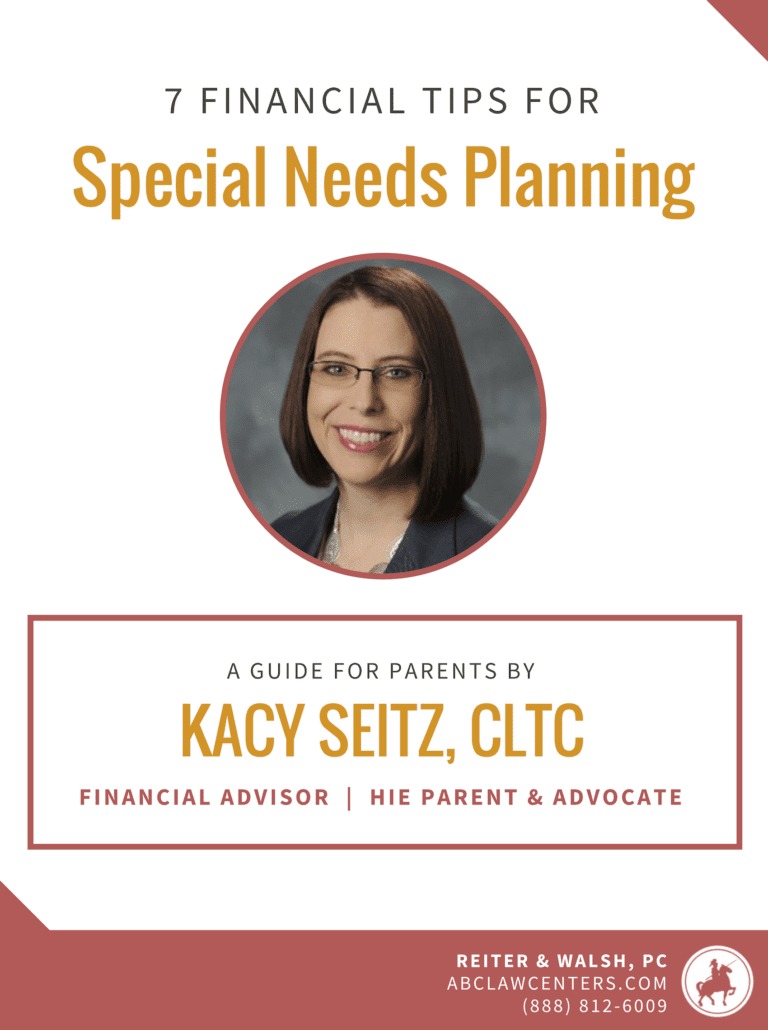7 Tips for Special Needs Planning
Written By: Kacy Seitz, Northwestern Mutual
At some point, many parents ask themselves “What will happen to my loved one when I die?” When you are the parent of a child or adult with special needs (like myself), that question takes on profound meaning. That’s because the planning you do today can help ensure your child continues to receive quality care and the services he or she needs throughout life, even after you’re gone.
Fortunately, there are special estate planning techniques that can be used to preserve your loved one’s eligibility for state and federal government benefit programs beyond age 18. Below are seven suggestions that may help you prepare for the financial future of your dependent with special needs.

1. Create a vision for your loved one’s care
Start by thinking about your hopes and dreams for your loved one and how your dependent’s needs are likely to change over time. Consider living arrangements, medical needs, educational aspirations, and caregiving choices. Be sure to include family members as you discuss your dependent’s future care needs.
2. Build a team
No one should have to navigate the complex process of special needs planning alone. Having an experienced financial professional with expertise in working with families with special needs can help. He or she can help you build a team of trusted advisors that includes an attorney, accountant, caregivers, and Government Benefits Specialist to help you determine the best financial and health strategy for your loved one. The Special Needs Alliance (special needs alliance.org) offers resources to help individuals with disabilities, their families and the professionals who serve them.
3. Develop a Letter of Intent
No one knows your loved one better than you. To help ensure there’s no interruption in care should something happen to you, create a document that addresses your loved one’s:
- Family and medical history
- List of medical, social services and care providers’ names and contact information
- Preferred living arrangements and housing
- Education and participation in government programs
- Religion and values
- Daily routine and living skills, including likes and dislikes and favorite foods, activities and entertainment
Although it is not a legally binding document, a Letter of Intent can provide a blueprint to help caregivers understand your hopes and wishes for your loved one and guide them in providing future care.
4. Prepare, review and update your will or trust and other legal documents
A will or trust declares how you want your estate to be distributed; it also names a legal guardian for your dependent when you pass away. You’ll want to meet with your planning team regularly to review your will or trust and your retirement account and insurance beneficiary designations and other legal documents (such as power of attorney documents and healthcare proxies) to make sure they are relevant and don’t inadvertently jeopardize your dependent’s access to government programs.
5. Understand how government programs work
Most government programs, such as Medicaid and Supplemental Social Security (SSI), are income sensitive; they also have specific definitions of disability (in the case of Medicaid, eligibility can also vary from state to state). The Social Security Administration also offers a helpful brochure (Social Security Benefits for Children with Disabilities) that can help you understand the program and its benefits. Adding a Government Benefits Specialist to your team can also help in this area.
6. Consider a trust
One planning tool that may be most helpful in helping you to provide for your dependent’s needs is a trust. A properly drafted trust gives you the ability to set aside money for the future without worry that these funds will interfere with your loved one’s eligibility for federal benefits. Many parents fund their trust with life insurance, helping to provide a cost-effective way to leave significant assets for your dependent’s long-term care. Because there are several types of trusts available that serve different purposes and law affecting trusts vary by state, you’ll want to consult with your planning team to identify the right trust for your particular needs.
7. Build your savings with ABLE
Even if your child qualifies for government assistance, there are a number of expenses that won’t be covered by insurance or other programs. This is why personal savings can be so important. In December of 2014, Congress authorized the creation of 529 ABLE Plans – tax-advantaged accounts that enable parents, grandparents, family members and friends to contribute up to $14,000 (in 2017) per account per year for the benefit of a person who is blind or disabled without impacting eligibility for certain government benefits. You should leverage the trusted advisors on your special needs planning team to help you determine how these plans fit into your overall vision for your loved one’s care.
No one can replace the love and care you give to your child with special needs. However, the planning you do now can go a long way to ensuring your loved one has the financial support and competent care he or she will need once you’re gone.
Article prepared by Northwestern Mutual with the cooperation of Kacy Seitz. Kacy Seitz is a Financial Advisor with Northwestern Mutual, the marketing name for The Northwestern Mutual Life Insurance Company (NM), Milwaukee, Wisconsin, and its subsidiaries. Kacy Seitz is based in Kansas City, MO. To contact Kacy Seitz, please call (816) 412-1538, e-mail at kacy.seitz@nm.com or visit kacyseitz.nm.com. Visit her webpage here.
Related: Using the Birth Injury Settlement
Keziah’s parents discuss their experience with ABC Law Centers: Birth Injury Lawyers